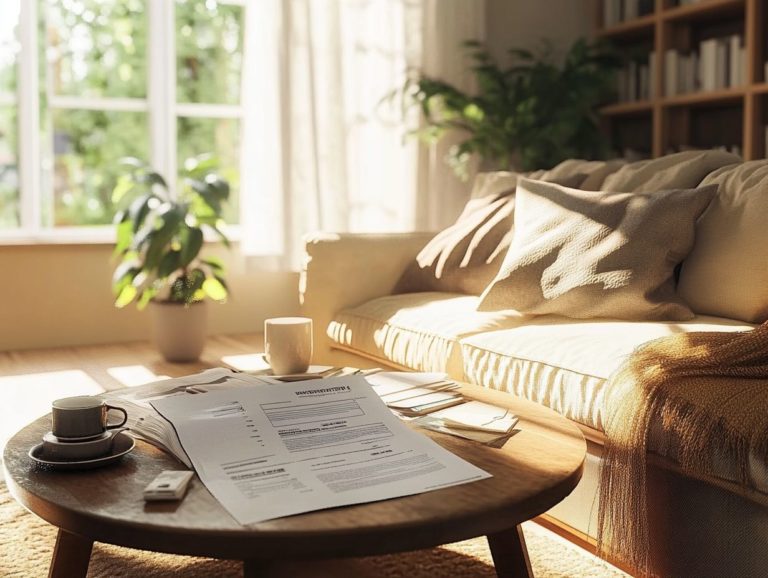5 Best Practices for First-Time Home Buyers
Buying your first home is both an exhilarating and intimidating journey. With an endless array of decisions to make and factors to weigh, it s natural to feel a bit overwhelmed.
Get ready to discover five must-know best practices to navigate the home-buying process with confidence! From establishing a realistic budget to recognizing the importance of getting pre-approved for a mortgage, you’ll uncover key steps that empower you to make informed choices.
You will also explore common pitfalls to avoid and learn effective negotiation strategies. Whether you’re excited to discover your dream home or just beginning your exploration, this article is designed to support you at every turn.
Contents
Key Takeaways:

- Determine your budget and stick to it! This helps you avoid financial strain.
- Get pre-approved for a mortgage! It streamlines your buying process.
- Research different neighborhoods! Consider factors like safety, schools, and amenities.
1. Determine Your Budget and Stick to It
Establishing your budget is the first step in buying a home. It lays the foundation for your journey and affects your choices on mortgage rates and property taxes.
To create a realistic budget, outline essential components, such as the down payment and your monthly payment limits. The size of your down payment directly affects your mortgage rate and overall loan amount. Knowing what s achievable based on your savings is vital.
Keep your credit score in mind, as it significantly influences the loan offers and interest rates available to you. Assessing your financial health allows you to determine reasonable monthly payments while factoring in property taxes and closing costs.
By combining these elements, you can craft a comprehensive budget that accommodates both expected expenses and any surprises along the way.
2. Get Pre-Approved for a Mortgage
Securing a pre-approved mortgage is an important milestone for first-time homebuyers. It gives you a clear estimate of how much you can borrow and helps you understand interest rates, boosting your standing during the home buying journey.
To kick off this process, start gathering crucial documents like pay stubs, tax returns, and proof of assets. These are vital for the lenders assessment.
Next, familiarize yourself with various mortgage options, such as FHA, VA, and USDA loans. Each one is tailored to meet different requirements, so understanding these options empowers you to make informed choices that align with your goals.
The role of mortgage lenders is important; they guide you through the application process and evaluate your financial readiness. A robust pre-approval assists in calculating your monthly payments and boosts your confidence, making you a more appealing prospect to sellers in a competitive market.
3. Research Different Neighborhoods

Researching different neighborhoods is crucial for you as a first-time homebuyer. It enables you to grasp the housing market, spot real estate trends, and make informed decisions all while considering factors like property insurance and buyer assistance programs.
This journey also means assessing amenities such as parks, shopping centers, and public transportation options, which can greatly impact your daily life.
Evaluating school districts is essential; the quality of education affects your family’s satisfaction and the future value of your property.
Being aware of current market conditions provides valuable insights into pricing trends and potential returns on your investment.
As a first-time buyer, it’s wise to explore local buyer assistance programs. Utilizing resources like the 5 steps to a successful home purchase can ease financial pressures, making your path to homeownership more accessible and less intimidating.
4. Hire a Real Estate Agent
Hiring a knowledgeable real estate agent can truly transform your home buying experience, especially as a first-time buyer. They bring expertise in negotiation strategies, a keen understanding of your needs, and effective management of closing costs. Additionally, they can guide you on 5 ways to save for your first home.
When selecting the right agent, consider their experience and familiarity with the local market. A seasoned agent will offer valuable insights into neighborhood trends and property values, empowering you to make informed choices.
Taking the time to review past client testimonials can illuminate an agent’s reliability and approachability two essential qualities for building trust. Ultimately, leveraging the expertise of a qualified real estate agent will benefit you through smooth transactions, meticulous oversight of paperwork, thorough home inspections, and adept negotiations.
This ensures a less stressful journey toward homeownership.
5. Don’t Rush into a Purchase
Imagine the joy of finding your perfect home! As a first-time homebuyer, it’s essential to avoid the urge to rush into a purchase. Taking the time to evaluate your financial health, conduct thorough home inspections, and explore first-time home buyer resources will empower you to make informed, satisfying decisions.
By weighing different options and comparing various properties, you can discover a home that genuinely meets your needs while staying within your budget. It s vital to resist the urge to make hasty choices, especially in competitive markets or when confronted by persuasive sellers.
Patience is your ally; stepping back to analyze every facet, including mortgage terms and potential future expenses, can save you from costly missteps. This thoughtful approach enhances your sense of security and cultivates confidence in your investment.
What Are the Benefits of Buying a Home?

Purchasing a home presents a wealth of advantages, including the opportunity to build equity, provide stability for your family, and serve as a long-term investment in an ever-evolving housing market all while underpinned by prudent financial choices and steady income.
Beyond these core benefits, homeownership unlocks valuable tax deductions, such as those for mortgage interest and property taxes, which can significantly lighten your overall tax burden.
It cultivates a deeper sense of community, as homeowners tend to engage more actively in local initiatives and enhance their neighborhoods.
Moreover, owning a home acts as a natural safeguard against inflation, enabling you to grow your wealth over time as property values appreciate. Ultimately, this financial stability lays the groundwork for future investments, creating a robust foundation for your family’s economic well-being.
What Are the Common Mistakes First-Time Home Buyers Make?
First-time homebuyers often stumble into a few common traps that could jeopardize their financial future. For instance, failing to conduct a thorough mortgage comparison, not accounting for monthly costs, and neglecting the long-term costs of homeownership can all derail your financial journey. To avoid these pitfalls, consider these 5 tips for first-time home buyer negotiations.
Many overlook the importance of budgeting adequately, which can lead to financial strain down the line. Skipping essential home inspections might allow hidden issues to slip under the radar, potentially resulting in hefty repair bills later on.
Not going through the preapproval process can leave you in a precarious position when it comes time to make an offer, as it may prevent you from fully understanding your financing capabilities.
To navigate these pitfalls effectively, it’s vital for you to engage in comprehensive financial planning and perform due diligence throughout the home-buying process. Being aware of local real estate trends for first-time buyers ensures that you account for all potential expenses and secure favorable mortgage terms, paving the way for a smooth transition into homeownership.
What Are the Upfront Costs of Buying a Home?
Understanding the upfront costs of purchasing a home is essential for first-time buyers. It includes several costs, such as down payments and closing costs, as well as critical home loan documents that can significantly influence your budget.
These costs can vary significantly based on the type of mortgage you choose whether it s an FHA, VA, or USDA loan. For example, down payments generally range from 3.5% for FHA loans to zero for VA loans, making these options particularly appealing for eligible buyers.
Don’t overlook inspection fees, which are vital for uncovering potential issues in a property. These fees typically average between $300 and $500. Title fees, which facilitate the legal transfer of ownership, vary in cost depending on local regulations.
By understanding these diverse expenses, you’ll feel more ready and confident for the financial commitment that lies ahead as a future homeowner.
How Can You Negotiate a Better Price for a Home?

Implementing effective negotiation strategies is crucial for first-time homebuyers, and understanding the ways agents can help them secure a better price for their future home is essential.
Partnering with a skilled real estate agent can significantly enhance your ability to leverage market conditions and negotiate seller concessions. These professionals provide invaluable insights, such as understanding the seller’s motivations, which can be pivotal in shaping your negotiations.
For instance, if a seller is eager to close quickly due to personal changes, you can use this information to propose terms that are particularly appealing. Presenting competitive offers backed by solid market data can strengthen your negotiating position, showcasing your knowledge and seriousness to the seller.
By combining these techniques, you can navigate the complexities of real estate transactions with greater confidence and effectiveness.
What Are the Key Factors to Consider When Choosing a Home?
When choosing a home as a first-time buyer, consider key factors that align with your specific needs and potential for future growth, while also exploring 5 tips for first-time home buyer grants to support your financial decisions.
Beyond your personal preferences, evaluating the property’s location is crucial, as it can greatly impact your daily life and overall convenience. The size of the home, including the number of bedrooms and bathrooms, should meet both your current and anticipated family needs.
Amenities such as proximity to schools, parks, and shopping centers not only enhance your lifestyle but also have the potential to boost future resale value.
A comprehensive home inspection is vital. It reveals hidden issues ranging from plumbing problems to structural concerns that could lead to costly surprises later, ultimately affecting your long-term investment.
Start planning your home-buying strategy today!
How Can You Prepare for the Closing Process?
Preparing for the closing process is an essential step for you as a first-time homebuyer. This phase involves understanding home loan documents, estimating closing costs, and making informed financial decisions with your mortgage lender.
During this crucial period, it s vital for you to review all closing documents carefully. Make sure every term and condition is clear and accurate. Don’t hesitate to ask questions about any unfamiliar clauses or numbers before you sign.
Understanding the final costs is equally important. This includes not just the down payment, but also various fees, such as title insurance, appraisal, and escrow fees.
Keep open lines of communication with your mortgage lender to clarify any lingering questions you might have about the loan details. Engaging in this dialogue will help ensure a smooth transition into homeownership, with all necessary documents organized and ready for a successful transfer.
Your Home Buying Questions Answered!
What are the 5 best practices for first-time home buyers? The 5 essential tips for first-time home buyers are: setting a budget, saving for a down payment, getting pre-approved for a mortgage, researching neighborhoods, and considering additional costs such as utilities and maintenance.
Why is setting a budget important for first-time home buyers?
Setting a budget helps determine how much house you can afford. This ensures you do not overextend yourself financially and gives you a clearer idea of what type of home to consider.
How much should I save for a down payment?
It is recommended to save at least 20% for a down payment. This helps you avoid paying private mortgage insurance and gives you more equity in your home from the start.
Why should I get pre-approved for a mortgage?
Getting pre-approved shows sellers that you are a serious buyer and can afford the home you are interested in. It also gives you a better understanding of your budget and can expedite the home buying process.
What should I research when looking at different neighborhoods?
When researching neighborhoods, consider factors such as crime rates, school districts, property values, and proximity to amenities like grocery stores and public transportation. Visiting the neighborhoods in person helps you get a better feel for the community.
Are there any additional costs I should be aware of as a first-time home buyer?
Yes, in addition to the cost of the home, first-time buyers should budget for additional costs such as utilities, property taxes, and maintenance. It is important to factor these into your budget to avoid financial surprises after purchasing a home.






